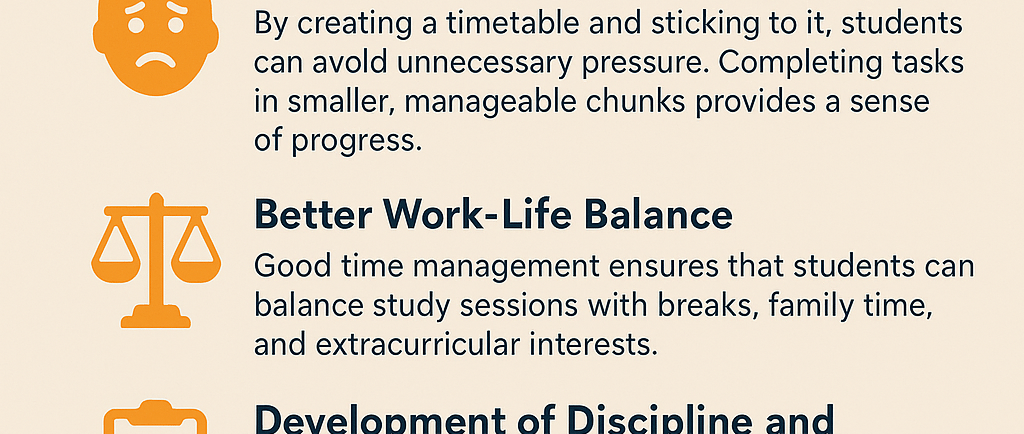The Benefits of Time Management for Students
.


Time is one of the most valuable resources in a student’s life, yet it often feels like there is never enough of it. Between classes, assignments, exams, extracurricular activities, and personal responsibilities, students can easily feel overwhelmed. This is where time management becomes a crucial skill. Effective time management not only improves academic performance but also helps students maintain balance, reduce stress, and build habits that last a lifetime.
1. Improved Academic Performance
One of the greatest benefits of time management is better academic results. When students plan their schedules, they can allocate sufficient time for studying, revising, and completing assignments without rushing at the last minute. This structured approach ensures deeper understanding of subjects and reduces the likelihood of errors. With consistency, students can achieve higher grades and develop confidence in their learning abilities.
2. Reduced Stress and Anxiety
Procrastination often leads to last-minute panic and sleepless nights. Poor time management creates a cycle of stress, which negatively affects health and focus. By creating a timetable and sticking to it, students can avoid unnecessary pressure. Completing tasks in smaller, manageable chunks provides a sense of progress and prevents overwhelming workloads from piling up.
3. Better Work-Life Balance
Student life is not only about academics; it also includes social activities, hobbies, and personal growth. Without proper planning, academic responsibilities can consume all available time, leaving little room for relaxation or fun. Good time management ensures that students can balance study sessions with breaks, family time, and extracurricular interests. This balance enhances overall well-being and prevents burnout.
4. Development of Discipline and Responsibility
Time management teaches students the importance of discipline. By learning to prioritize tasks, set deadlines, and stick to a routine, they develop responsibility and accountability. These qualities are not only essential for academic success but also prepare students for professional life, where deadlines and commitments are part of daily responsibilities.
5. Increased Productivity and Focus
When time is managed well, students can focus on one task at a time instead of multitasking inefficiently. This concentrated effort increases productivity and allows them to accomplish more in less time. A well-structured study schedule also helps students identify their most productive hours, enabling them to work smarter, not harder.
6. More Opportunities for Growth
Effective time management opens doors to additional opportunities. Students who manage their schedules efficiently can take part in internships, competitions, or skill-building workshops without neglecting their studies. These opportunities contribute to personal and professional development, making them more well-rounded individuals.
Conclusion
Time management is not just about scheduling tasks—it is about creating a balanced lifestyle that promotes learning, health, and personal growth. For students, mastering this skill leads to academic excellence, reduced stress, and a sense of control over their future. By valuing time and using it wisely, students not only achieve immediate goals but also build a foundation for lifelong success.
